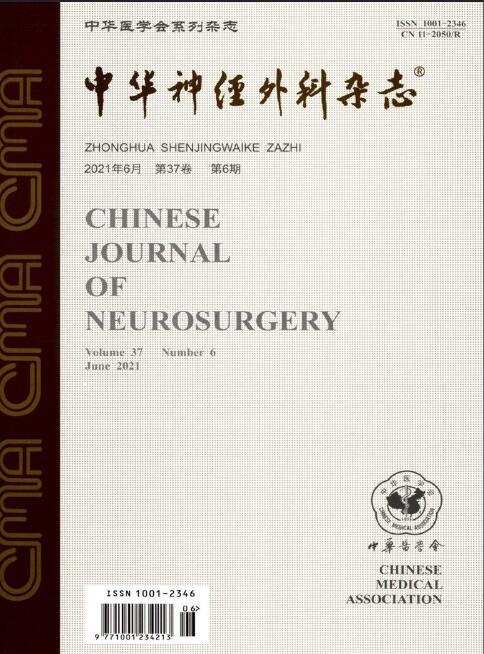Efficacy of neuronavigation-assisted endoscopic transsphenoidal surgery for invasive pituitary adenomas
Q4 Medicine
引用次数: 0
Abstract
Objective To explore the effect of neuronavigation-assisted endoscopic transsphenoidal surgery for invasive pituitary adenomas. Methods A retrospective analysis was conducted on 40 patients with invasive pituitary adenomas admitted to Department of Neurosurgery, Affiliated Dalian Municipal Central Hospital, Dalian Medical University from January 2010 to March 2018. Among those patients, 20 were treated with neuronavigation-assisted endoscopic transnasal sphenoidal surgery (endoscopic group) and the other 20 were treated with traditional transnasal microsurgery (control group). The complete tumor resection rate, postoperative complication rate and tumor recurrence rate were compared between the 2 groups. Results There were no significant differences in gender, age, clinical manifestations, endocrine examination results, Knosp classification of pituitary adenomas or maximum diameter of tumors between the 2 groups (all P>0.05). The total resection rate of endoscopic group was higher than that in the control group[65.0% (13/20) vs. 20.0% (4/20), P 0.05). Conclusion Neuronavigation-assisted endoscopic transnasal sphenoidal surgery for invasive pituitary adenomas is associated with higher total resection rate and lower recurrence rate compared with traditional transnasal sphenoidal microsurgery. Key words: Pituitary neoplasms; Neoplasm invasiveness; Neuronavigation; Natural orifice endoscopic surgery; Treatment outcome神经导航辅助下经蝶窦内镜手术治疗侵袭性垂体腺瘤的疗效观察
目的探讨神经导航辅助下经蝶窦内镜手术治疗侵袭性垂体腺瘤的效果。方法对2010年1月至2018年3月大连医科大学附属大连市中心医院神经外科收治的40例侵袭性垂体腺瘤患者进行回顾性分析。其中神经导航辅助下经鼻蝶窦内镜手术20例(内镜组),传统经鼻显微手术20例(对照组)。比较两组患者肿瘤全切除率、术后并发症发生率及肿瘤复发率。结果两组患者在性别、年龄、临床表现、内分泌检查结果、垂体腺瘤Knosp分型、肿瘤最大直径等方面差异均无统计学意义(P < 0.05)。内镜组总切除率高于对照组[65.0%(13/20)比20.0% (4/20),P < 0.05]。结论神经导航辅助下经鼻蝶腔内镜手术治疗侵袭性垂体腺瘤比传统经鼻蝶腔显微手术具有更高的全切除率和更低的复发率。关键词:垂体肿瘤;肿瘤侵袭性;Neuronavigation;自然孔内窥镜手术;治疗结果
本文章由计算机程序翻译,如有差异,请以英文原文为准。
求助全文
约1分钟内获得全文
求助全文
来源期刊

中华神经外科杂志
Medicine-Surgery
CiteScore
0.10
自引率
0.00%
发文量
10706
期刊介绍:
Chinese Journal of Neurosurgery is one of the series of journals organized by the Chinese Medical Association under the supervision of the China Association for Science and Technology. The journal is aimed at neurosurgeons and related researchers, and reports on the leading scientific research results and clinical experience in the field of neurosurgery, as well as the basic theoretical research closely related to neurosurgery.Chinese Journal of Neurosurgery has been included in many famous domestic search organizations, such as China Knowledge Resources Database, China Biomedical Journal Citation Database, Chinese Biomedical Journal Literature Database, China Science Citation Database, China Biomedical Literature Database, China Science and Technology Paper Citation Statistical Analysis Database, and China Science and Technology Journal Full Text Database, Wanfang Data Database of Medical Journals, etc.
 求助内容:
求助内容: 应助结果提醒方式:
应助结果提醒方式:


